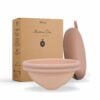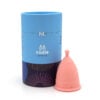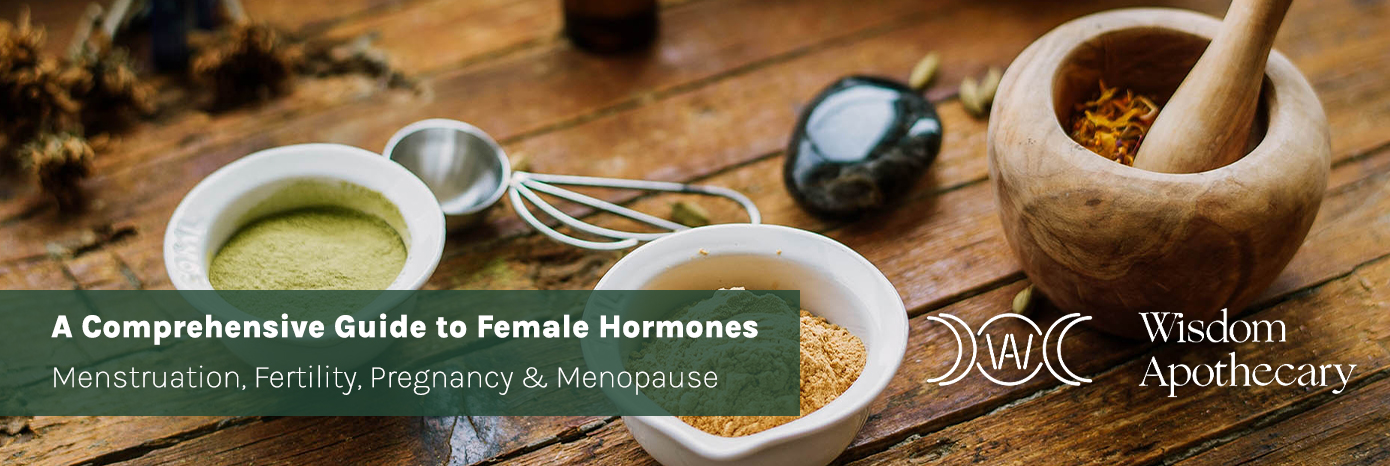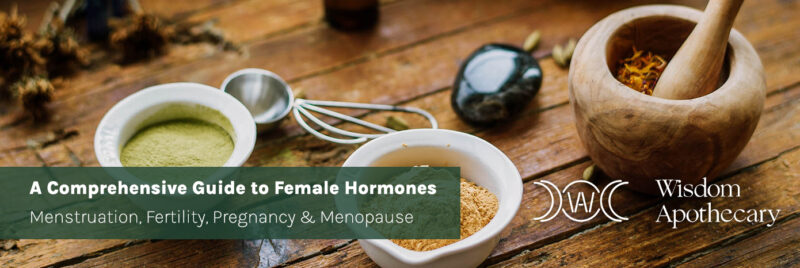Beauty News, Wisdom Apothecary
A Comprehensive Guide to Female Hormones: Menstruation, Fertility, Pregnancy & Menopause
Female hormones are the master alchemists that shape our bodies and minds throughout our lives. Estrogens, progesterone, FSH, LH, androgens, and prolactin each play a distinct role, orchestrating a symphony of biological changes that begin in puberty and culminate in menopause.
Join us as we explore how these hormones influence each stage of life, from the blossoming of youth to the wisdom of maturity.
Puberty: The Hormonal Awakening that Transforms Girls into Women
The primary goal of the hormones active during puberty is to drive our biological maturity, enabling us to become fertile women. To achieve this, hormones are responsible for developing our secondary sexual characteristics: breast growth, pubic hair, increased bone density, and the onset of menstruation (menarche).
Key Hormones During Puberty:
- FSH (Follicle-Stimulating Hormone) and LH (Luteinizing Hormone): These hormones rise and stimulate the production of estrogen and progesterone, which are crucial for the transition from puberty to sexual maturity.
- Estrogens and Progesterone: These hormones play a vital role in puberty by promoting the physical and physiological changes that mark the beginning of our reproductive phase. They help develop the vagina, uterus, and fallopian tubes, preparing the body for reproduction, and also contribute to breast development and fat distribution.
- Androgens: These hormones increase bone mass, making bones thicker and denser, which is essential for reaching maximum height during this growth phase. They also contribute to the growth of pubic and underarm hair and increase sebaceous production, leading to the common skin issues of adolescence.
- Prolactin: While its main role is in lactation, prolactin also influences breast development during puberty.
Menarche and the Menstrual Cycle: The Establishment of Fertility
The arrival of the first menstruation is a significant biological milestone that establishes the menstrual cycle—a hormonal dance that will repeat monthly for approximately 400-450 cycles throughout a woman’s life.
The primary purpose of these hormones is to prepare the body for a potential pregnancy, though they also have other roles in the body that extend beyond reproduction.
Key Hormones in the Menstrual Cycle:
- FSH: This hormone stimulates the growth of follicles in the ovaries and regulates the menstrual cycle.
- LH: Responsible for triggering ovulation and the formation of the corpus luteum after ovulation.
- Estrogens: These hormones rise in the first half of the cycle, promoting the thickening of the uterine lining to accommodate a fertilized egg. If fertilization does not occur, estrogen helps induce the shedding of the endometrium during menstruation. They also support vaginal lubrication and tissue elasticity, contributing to sexual health.
- Progesterone: The star of the luteal phase, progesterone’s main function is to prepare the uterine lining (endometrium) to receive and nourish an embryo if fertilization occurs. This hormone ensures that the endometrium is sufficiently thick and nutrient-rich to allow the embryo to implant and grow.
- Androgens: These hormones play important roles in metabolism, sexual function, insulin sensitivity, cardiovascular health, and bone health.
Pregnancy: The Magic of Creation
Pregnancy is a time of profound physical and emotional transformation, orchestrated by a delicate balance of hormones that support the growth and development of life and prepare the body for childbirth and lactation.
Key Hormones During Pregnancy:
- Estrogens: These hormones play a crucial role in stimulating the growth and expansion of the uterus, supporting the development of the placenta, and increasing the blood vessels needed to nourish the baby. As pregnancy progresses, they also help prepare the body for breastfeeding by developing the milk ducts in the mammary glands and increasing the elasticity of ligaments to facilitate childbirth.
- hCG (Human Chorionic Gonadotropin): Produced by the embryo, hCG ensures that the corpus luteum continues producing the progesterone needed to maintain early pregnancy.
- Progesterone: Acts as a guardian, helping to suppress the immune response to prevent the rejection of the embryo, promoting uterine growth, and preventing uterine contractions that could complicate the pregnancy. In later stages, progesterone helps prepare the cervix for childbirth.
- Relaxin: This hormone inhibits spontaneous uterine contractions and relaxes the ligaments, joints, and uterus to ease childbirth.
- Prolactin: Its mission is to prepare the body for breastfeeding by stimulating breast and mammary gland growth for milk production.
- Oxytocin: A multitasking hormone, oxytocin regulates the rhythm of childbirth by stimulating contractions and, once the baby is born, helps expel the placenta and reduce postpartum bleeding. It is also the hormone activated by your baby’s crying and sucking, facilitating milk ejection. Often called the “love hormone,” oxytocin fosters an emotional bond with your baby, promoting feelings of love, calm, and closeness.
Menopause: The Hormonal Reset of the Wise Woman
Menopause marks the end of the reproductive stage, a time of hormonal transition that brings a significant decline in hormone production and consequently some symptoms that can be alleviated with the help of natural remedies. It also marks an important rite of passage into a new phase of womanhood.
Key Hormones During Climacteric and Menopause:
- FSH and LH: In this phase of life, FSH and LH levels increase in an attempt to stimulate the ovaries, but since egg production has ceased, irregular menstrual cycles and varying degrees of bleeding begin.
- Estrogens: These hormones decrease significantly, marking the end of menstruation and causing hot flashes, night sweats, vaginal dryness, mood changes, loss of bone density, vaginal atrophy, changes in cholesterol levels, and skin changes.
- Progesterone: Levels of this hormone gradually decrease, affecting sleep patterns and mood, leading to irritability, anxiety, and mood swings.
- Androgens: A decline in these hormones reduces sexual desire and leads to the loss of muscle mass.
Female sex hormones are essential for women’s overall health and well-being. The levels of these hormones naturally fluctuate throughout our lives, potentially causing a range of symptoms that can be managed with the help of nature.
******
This article is for informational purposes only and is not intended to diagnose, offer medical or nutritional treatment, or replace the advice of a professional therapist. Always consult a healthcare professional before starting any treatment.


























 Beauty Products
Beauty Products By Skintype
By Skintype Brands A-Z
Brands A-Z Wellness
Wellness Health / Nutrition
Health / Nutrition